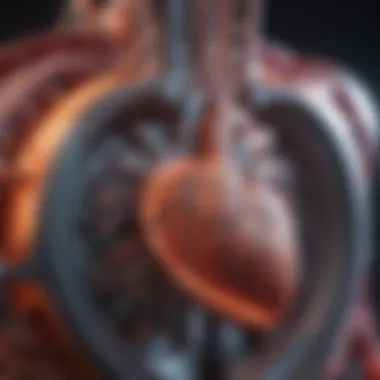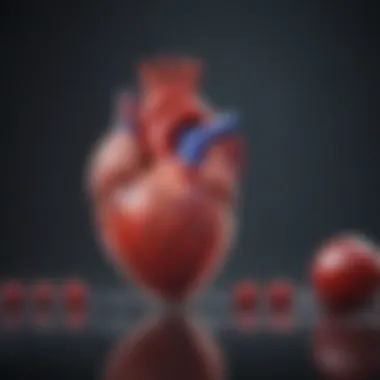Innovations in Cardiac Studies: A Comprehensive Overview


Intro
Cardiac health remains a pivotal aspect of overall well-being. The complexities surrounding heart diseases have prompted extensive research and innovative approaches to diagnosis and treatment. Within this article, the overarching themes of cardiac studies will be explored, offering insights into groundbreaking methodologies and the significance of ongoing research initiatives. Understanding how different factors—genetic, lifestyle, and medical interventions—interact can lead to better outcomes in cardiovascular care.
In this journey, we will provide a comprehensive overview that encapsulates the methodologies employed in cardiac studies, and discuss their implications. We will also delve into the limitations of existing research and propose directions for future studies. By highlighting critical findings and methodologies, this article aims to enrich the reader's understanding of cardiac health.
Methodology
Study Design
Cardiac studies encompass a variety of study designs, ranging from observational to interventional. Each design has its advantages and constraints, impacting how data on heart health is interpreted. Randomized controlled trials (RCTs) are often regarded as the gold standard, providing robust evidence for the effectiveness of interventions. In contrast, cohort studies and case-control studies offer valuable insights into risk factors and disease progression, although they may lack the same level of control over variables.
Data Collection Techniques
Data collection for cardiac studies can be extensive and multifaceted. Common techniques include:
- Echocardiograms: These ultrasound examinations provide real-time images of heart structures.
- Electrocardiograms (ECGs): Used to measure the electrical activity of the heart, revealing arrhythmias and other issues.
- Clinical trials: Participants may undergo various tests to assess the efficacy of new therapies.
- Surveys and Questionnaires: For gathering lifestyle data, patient-reported outcomes, and symptom assessments.
These methodologies enable researchers to gather comprehensive data that can inform clinical practices.
Discussion
Interpretation of Results
The results obtained from cardiac studies illuminate crucial information regarding heart health. When interpreting these results, it is essential to consider the context, including participant demographics and study settings. Result analysis often reveals correlations among variables, such as the impact of lifestyle choices on heart health.
Limitations of the Study
Every research endeavor carries limitations. Common issues in cardiac studies may include:
- Sample Size: Small sample sizes can lead to inconclusive results.
- Generalizability: Results obtained from specific populations may not apply to broader demographics.
- Bias: Selection bias, recall bias, and attribution bias can skew findings.
Recognizing these limitations allows researchers to approach findings with a critical eye, guiding future inquiries.
Future Research Directions
Looking ahead, several areas warrant further investigation in cardiac studies:
- Integration of Technology: Wearable devices and telemedicine can enhance monitoring and intervention strategies.
- Longitudinal Studies: Following participants over an extended period can yield deeper insights into the progression of cardiovascular diseases.
- Genomic Research: Exploring genetic predispositions and their influence on heart diseases can provide targeted treatment approaches.
Interest in these directions promises to yield significant advancements in cardiovascular care, ultimately leading to improved patient outcomes.
Preamble to Cardiac Studies
Cardiac studies offer a vital exploration into the intricacies of heart health, providing insights that can save lives. The focus of this section is to highlight the significance of cardiac studies in the medical field. Understanding cardiac studies is crucial for professionals and researchers engaged in healthcare, as it provides a foundation for both clinical treatment and innovative research.
Definition and Importance of Cardiac Studies
Cardiac studies involve the examination of the heart's functions, diseases, and treatments. These studies encompass a broad spectrum of research, from basic science investigating heart physiology to clinical trials assessing new medicines or procedures. The importance of cardiac studies lies in their potential to improve diagnosis, treatment, and prevention of cardiovascular diseases, which are leading causes of global mortality.
To delve deeper into the significance:
- Prevalence: Cardiovascular diseases encompass a variety of conditions, including heart attacks and strokes, affecting millions worldwide.
- Impact on Health Policies: These studies inform public health strategies aimed at reducing the burden of heart disease.
- Guiding Innovations: They enable medical advances, leading to better patient outcomes through innovative surgical techniques and drugs.
In essence, cardiac studies not only gather critical data but also translate such knowledge into practical applications that can enhance heart health.


Historical Context of Cardiac Research
The field of cardiac research has evolved substantially over the years. Early studies primarily focused on basic anatomy and physiology of the heart. Groundbreaking discoveries in the 20th century shifted attention towards understanding heart diseases at a molecular level. For instance, the development of electrocardiography in the early 1900s represented a revolution in diagnosing heart conditions.
Furthermore, the establishment of organizations such as the American Heart Association and the World Health Organization has crucially impacted research funding and public awareness.
Some key historical milestones include:
- 1940s: The introduction of surgical techniques such as heart bypass surgery.
- 1980s: The advent of non-invasive imaging techniques, significantly improving diagnosis.
- 21st Century: Integrating genetics into cardiac studies with an emphasis on precision medicine.
These developments reflect an ongoing commitment to understanding and combatting heart disease. This context underscores the relevance of current studies and inspires innovative research aimed at future advancements.
Key Areas of Cardiac Research
The realm of cardiac research is vast and multifaceted. A thorough understanding of the key areas in this field is essential for grasping how we can combat cardiovascular diseases effectively. Each area reveals critical insights that inform treatment strategies, clinical practices, and innovations in healthcare. This section delves into three pivotal domains: epidemiology of cardiovascular diseases, pathophysiology of cardiac conditions, and genetic factors in heart disease.
Epidemiology of Cardiovascular Diseases
Epidemiology plays a foundational role in public health by providing data on the distribution and determinants of cardiovascular diseases (CVD). Understanding how these diseases spread within populations allows researchers and health professionals to identify at-risk groups and tailor interventions accordingly. Statistics show that CVD remains a leading cause of mortality worldwide, affecting millions.
Epidemiological studies utilize various methodologies, such as cohort and case-control studies, to collect vital data. They help uncover risk factors such as hypertension, diabetes, and lifestyle choices like smoking and diet. This knowledge is crucial in developing prevention strategies, guiding policy decisions, and directing resources effectively. For instance, awareness campaigns targeting high-risk populations can significantly reduce incidence rates over time.
Furthermore, geographical disparities in data often highlight the influence of socio-economic factors on heart health. Urban areas, for example, may show higher prevalence due to lifestyle factors and pollution. Such insights prompted initiatives aimed at addressing health inequalities, making epidemiology an invaluable tool in combating CVD.
Pathophysiology of Cardiac Conditions
Delving into the pathophysiology of cardiac conditions enables a greater understanding of how cardiovascular diseases develop and progress. It studies the biological mechanisms that drive heart conditions like coronary artery disease, hypertension, and heart failure. By identifying these mechanisms, researchers can develop targeted therapies to improve patient outcomes.
A critical aspect of pathophysiology involves investigating how different factors, like inflammation and oxidative stress, contribute to the progression of heart disease. For instance, inflammation in the arteries can lead to atherosclerosis, which impairs blood flow. Understanding these processes also helps in identifying potential biomarkers for early detection, critical in improving treatment protocols.
The integration of advanced technologies, such as imaging and molecular diagnostics, has enhanced our understanding of cardiac pathophysiology. These innovations allow for greater accuracy in diagnosing conditions and monitoring disease progression, leading to more personalized treatment plans.
Genetic Factors in Heart Disease
Genetic factors are increasingly recognized for their role in cardiac health. Research in this area focuses on how inherited traits influence susceptibility to heart disease. Studies have shown that certain genetic variations can predispose individuals to conditions like familial hypercholesterolemia or arrhythmias. Understanding these genetic links opens the door for personalized medicine, where treatments can be tailored based on an individual’s genetic profile.
Moreover, the emergence of technologies like genome sequencing has transformed the landscape of cardiac research. Researchers can now identify specific genes associated with heart conditions, leading to advancements in preventive measures and therapies. It not only encompasses direct genetic influences but also considers the interplay between genetics and environmental factors. This holistic approach emphasizes the complexity of heart disease and illustrates how multifaceted research may lead to innovative solutions.
In summary, the key areas of cardiac research form a rich tapestry that informs all aspects of cardiac care. By addressing epidemiology, pathophysiology, and genetics, this field is poised to make substantial advancements in understanding and treating cardiovascular diseases. This knowledge can shape policy, foster innovations, and ultimately save lives.
"Understanding the interplay between genetics, lifestyle, and environmental factors is fundamental to advancing cardiac health."
Through ongoing investment in these key research areas, we can look forward to improved health outcomes and innovative approaches in cardiac care.
Methodologies in Cardiac Studies
The methodologies employed in cardiac studies are crucial for understanding and addressing cardiovascular diseases. They provide a structured approach to research, highlighting how data is collected, analyzed, and interpreted. The significance of these methodologies cannot be overstated, as they lay the foundation for evidence-based practices. Without robust methodologies, any findings may lack reliability and validity, leading to poor clinical decisions.
Furthermore, the diverse methodologies allow researchers to explore various aspects of cardiac health. For example, clinical trials help assess new treatments, while imaging techniques offer visual insights into the heart's condition. Each methodology contributes uniquely, offering different advantages, but they all aim to improve heart health outcomes.
Clinical Trials in Cardiovascular Research
Clinical trials are a pivotal part of cardiovascular research, serving as the bridging point between experimental therapies and standard care. These studies evaluate the effectiveness of new drugs, procedures, or lifestyle changes in a controlled environment. The rigorous nature of clinical trials ensures that findings are valid, providing a scientific basis for treatment options.
Moreover, clinical trials can vary in structure. Some are randomized controlled trials, where participants are randomly assigned to receive either the treatment or a placebo. This minimizes bias and strengthens the evidence gathered. Others may be cohort studies or case-control studies, each designed to gather different types of information about heart health.
Importantly, clinical trials not only test treatments but also assess safety. The ethical considerations involved are significant, requiring informed consent and ongoing monitoring of participants. This commitment to participant welfare is essential in maintaining public trust in medical research.


Imaging Techniques for Cardiac Assessment
Imaging techniques play a vital role in the assessment of cardiac health. These non-invasive methods provide critical insights into the structure and function of the heart, enabling clinicians to make informed decisions. Common modalities include echocardiography, magnetic resonance imaging (MRI), and computed tomography (CT) scans.
Echocardiography, for instance, uses sound waves to create live images of the heart. This technique allows for the evaluation of heart size, chamber function, and blood flow. MRI, on the other hand, offers detailed images of the heart anatomy and is particularly useful when assessing complex conditions. CT scans can be utilized to visualize coronary artery diseases.
The integration of these technologies enhances the accuracy of diagnoses and treatment plans. By providing real-time data, imaging techniques allow for prompt adjustments in patient care, thereby increasing the chances of better outcomes.
Biomarkers and Their Role in Cardiac Studies
Biomarkers serve as measurable indicators of biological processes or responses to treatment, particularly in cardiac studies. They are crucial for early diagnosis and management of heart diseases. Common biomarkers, such as troponin, B-type natriuretic peptide, and lipid profiles, provide insights into the presence and severity of cardiovascular conditions.
The use of biomarkers enables clinicians to track disease progression and response to therapy more accurately. For example, elevated levels of troponin in the blood can indicate myocardial damage, prompting urgent intervention. Similarly, lipid profiles help assess risks related to atherosclerosis and other cardiac events.
In research, biomarkers can also aid in identifying patient subgroups that may respond differently to certain treatments. This emphasis on precision medicine is paving the way for more tailored therapies, which could revolutionize how heart diseases are managed.
"Understanding methodologies in cardiac studies is essential for advancing treatment and improving patient outcomes. Effective methodologies support robust research that ultimately saves lives."
Advancements in Cardiac Technology
The realm of cardiac technology has transformed significantly in the past few decades. It is crucial to recognize how innovations in this area have improved patient outcomes, streamlined diagnostic processes, and expanded treatment options. A focus on advancements in this field encapsulates a variety of technologies that not only support medical professionals but also empower patients in managing their heart health more effectively.
Innovative Surgical Techniques
Innovative surgical techniques are at the forefront of cardiac technology advancements. Procedures such as minimally invasive heart surgery have gained traction. These techniques often result in shorter recovery times, reduced pain, and lower risk of complications compared to traditional open-heart surgeries. Surgeons now utilize robotic assistance for intricate heart valve repairs, which improves precision and outcomes.
Additionally, transcatheter aortic valve replacement (TAVR) is a less invasive alternative for patients with severe aortic stenosis. Using catheters, doctors can install a new valve without opening the chest. These advancements in surgical methods lead to improved patient satisfaction and a quicker return to daily activities.
Wearable Technology for Heart Monitoring
Wearable technology is another key area of innovation in cardiac health. Devices like smartwatches and fitness trackers now come equipped with heart rate monitoring features. These wearables allow for continuous tracking of heart rhythms, which is valuable for detecting arrhythmias and other cardiac anomalies early on. Many users can receive alerts to consult a doctor if irregularities are noted.
The data gathered from these devices also contribute to personalized health insights. For instance, individuals can monitor changes in their physical activity levels and heart responses in real-time. This capability fosters proactive management of heart health, causing a shift towards preventive care. Patients can discuss their wearable data with healthcare providers, forming a comprehensive approach to manage their cardiovascular well-being.
Telemedicine in Cardiac Care
Telemedicine has significantly reshaped how cardiac care is delivered. With the ability to connect patients and practitioners remotely, follow-up consultations are now more accessible. This is especially beneficial for patients living in rural or underserved areas, where specialist access may be limited.
Moreover, telehealth platforms facilitate ongoing management of chronic conditions such as heart disease. Patients can participate in virtual health check-ins, allowing for timely adjustments to treatment plans. Remote monitoring technologies also enable physicians to track patients' progress without necessitating frequent office visits. As a result, both patient care efficiency and convenience are enhanced.
"The integration of technology in cardiac care not only streamlines processes but also fosters a culture of continuous health monitoring."
Challenges in Cardiovascular Research
The study of cardiovascular diseases faces numerous challenges that can impede the progress of research and the implementation of findings into practice. Understanding these challenges is fundamental for students, researchers, educators, and professionals who aim to advance cardiac studies. By navigating through these issues, the field can enhance the quality of care and outcomes for patients with heart conditions.
Ethical Considerations in Cardiac Studies
Ethics play a crucial role in cardiac research, particularly when considering the health and safety of participants. Researchers must ensure that informed consent is obtained, meaning that participants understand the risks and benefits of their involvement. There is also a responsibility to maintain privacy and confidentiality. The ethical principle of beneficence, which advocates for maximizing benefits while minimizing harm, must consistently guide these studies.
In certain cases, however, ethical dilemmas arise. For example, when testing new treatments, researchers must balance the potential for advancing medical knowledge against the risk posed to vulnerable populations. Research involving placebo treatments may also lead to ethical concerns, especially if a proven intervention is available. Therefore, ethical boards are essential in reviewing protocols, ensuring participant rights are upheld, and promoting sound ethical practices throughout the research process.
Funding and Resource Allocation Issues
Securing funding is one of the most significant hurdles in cardiovascular research. Limited funding can restrict the scope of studies, ultimately affecting the ability to conduct large-scale and long-term projects. Government grants, private investments, and institutional funding are the main sources of financial support. However, competition for these funds is intense, and many research proposals may not meet the stringent criteria required for approval.
Furthermore, the distribution of resources can be uneven, often favoring areas with higher visibility or that target more prevalent conditions. This creates gaps in research that address less common but equally critical cardiovascular issues. Addressing funding and resource allocation challenges requires a collaborative approach among stakeholders, including academia, industry, and government agencies, to ensure comprehensive investigation into all facets of heart health.


Recruitment Challenges in Clinical Trials
Recruiting participants for clinical trials is fraught with difficulties that can slow down the research process. Many trials fail to meet their target number of participants due to various reasons. Misconceptions about clinical trials, fear of side effects, and lack of awareness about the benefits of participation can deter potential candidates.
Additionally, demographic factors play a role. Ensuring diversity in clinical trials is necessary for gathering comprehensive data that is applicable to a wider population. However, trials often have eligibility criteria that can exclude certain individuals based on age, gender, or pre-existing conditions, leading to a skewed understanding of treatment efficacy.
To tackle recruitment challenges, strategies should include community engagement, educational outreach, and the use of technology. Using social media platforms like Facebook or forums like Reddit can reach a younger and more diverse demographic, increasing potential participant awareness of ongoing trials.
"Successful recruitment strategies are essential for the future of clinical trials in cardiovascular research. They can shape the way we understand heart diseases and improve patient care."
Overall, addressing these challenges in cardiovascular research is vital to enhance our understanding of heart health. By focusing on ethical considerations, overcoming funding issues, and improving recruitment strategies, the field can foster innovation and deliver improved outcomes in cardiovascular care.
Future Directions in Cardiac Research
The realm of cardiac research continuously evolves, presenting new potentials for enhancing heart health. Understanding future directions is crucial for developing effective interventions. Recent and ongoing investigations emphasize personalized medicine, artificial intelligence, and social factors in promoting cardiovascular well-being. These developments promise improved patient outcomes and tailored health strategies.
Exploring Personalized Medicine Approaches
Personalized medicine represents a significant shift in treating cardiovascular diseases. This approach uses genetic, environmental, and lifestyle factors to tailor treatments specifically for individuals. By understanding a patient's unique genetic makeup, clinicians can recommend therapies that are more likely to succeed, reducing the trial-and-error process commonly seen in traditional methods.
Moreover, personalized medicine can help identify individuals at higher risk for heart diseases. For instance, individuals with certain genetic markers may benefit from early interventions. Genetic testing, combined with lifestyle assessments, can guide tailored lifestyle modifications and treatment plans.
The benefits are twofold: patients receive targeted therapies, and the overall healthcare system can allocate resources more efficiently. However, it is essential to address ethical considerations, including data privacy and access to advanced testing.
Role of Artificial Intelligence in Cardiology
Artificial intelligence (AI) brings a transformative perspective to cardiac research and care. Its ability to process vast amounts of data quickly allows for improved diagnostic tools and predictive models. For example, algorithms can analyze imaging data and identify patterns that might elude the human eye, leading to earlier diagnosis of conditions like heart failure.
AI also enhances patient monitoring. Wearable devices equipped with AI can continuously track heart rhythms and detect anomalies in real-time, allowing for immediate medical intervention when necessary. Additionally, predictive analytics can identify at-risk patients, facilitating proactive healthcare measures.
Despite its potential, the integration of AI into cardiology must be approached with caution. Questions regarding reliability and the need for adequate training for healthcare providers arise. Ensuring that AI systems are interpretable and transparent is vital for building trust and effectiveness in clinical environments.
Integration of Behavioral and Lifestyle Factors
The interplay of behavioral and lifestyle factors significantly impacts cardiovascular health. Future research must place greater emphasis on understanding how these factors influence heart disease and recovery. Regular physical activity, balanced nutrition, and mental health can alter disease trajectories positively.
Research indicates that heart disease is not solely a biological issue; rather, it is significantly influenced by lifestyle choices. Encouraging community-based healthy practices can promote long-term cardiovascular health.
Furthermore, integrating behavioral science with traditional clinical approaches can yield substantial benefits. For instance, cognitive-behavioral strategies can assist patients in making lasting lifestyle changes. Programs that encourage smoking cessation or weight loss can improve cardiac outcomes.
It is important for future cardiac research to include multidisciplinary collaboration, incorporating insights from behavioral science, nutrition, and community health. This comprehensive approach can address the multifaceted nature of cardiovascular disease, potentially leading to innovations that reshape cardiovascular care.
The future of cardiac research lies in understanding the intricate relationship between genetics, technology, and lifestyle, informing a more holistic approach to heart health.
Closure
In examining the landscape of cardiac studies, it becomes clear that a holistic approach is essential. This article consolidates significant findings, highlighting how various methodologies and innovations converge to enhance heart health. The sections discussed provide a thorough understanding of the intricacies involved in cardiac research, showing the complexity of factors influencing cardiovascular diseases.
Summary of Key Findings
Cardiac studies unveil numerous insights that are pivotal for healthcare and medical research. They emphasize the significant role of clinical trials in developing innovative treatments.
- Technological Integration: Advancements such as imaging techniques and wearable technology offer new avenues for monitoring heart health.
- Role of Genetics: Genetic predispositions play a crucial part in understanding cardiovascular conditions. Knowledge in this area is enhancing preventive measures and treatments.
- Ethical Considerations: Ethical dimensions in research stress the importance of integrity and trust within the medical community.
As discussed, diverse methodologies in cardiac studies not only shape treatment protocols but also illuminate personalized medicine's potential benefits that cater to individual patient needs.
Final Thoughts on the Future of Cardiac Studies
Looking ahead, cardiac studies are on cusp of transformation. The integration of artificial intelligence holds significant promise in personalizing cardiac care. AI will likely enable more precise diagnoses and tailoring interventions based on unique patient profiles. Furthermore, the incorporation of lifestyle factors stands as a pivotal component. Understanding how behaviors influence heart health will drive future research.
Overall, as the field continues to evolve, ongoing collaboration among researchers, clinicians, and technologists will be paramount in redefining cardiovascular care.
The trajectory indicates a need for more extensive studies that embrace both psychological and social aspects. Developing holistic treatment plans will not only improve outcomes but also ensure patients receive comprehensive care. As the future unfolds, the implications for public health are profound, paving the way for healthier societies.







